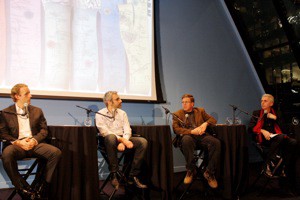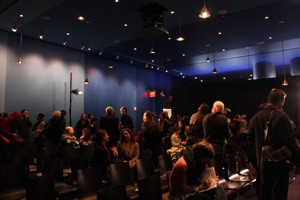news
Every Place Tells a Story

1. Bookforum editor Albert Mobilio. 2. The brilliant comments are flying at this point.


The Skyroom at the French Institute Alliance Francaise (FIAF) is beginning to feel pretty homey. Last night was the third installment of their Write About Now series and coincidentally the third I’ve covered for The Outlet. The bad news is the room is still blue. The good news is these things just keep getting better.
FIAF, Bookforum, and the Villa Gillet (the event was also part of their Walls and Bridges series, which might help explain why the Skyroom was unexpectedly crowded) assembled three map-obsessed authors and one distinguished geographer to talk about the way that stories are related to place. Here is your cast:
Reif Larsen, whose debut novel, The Selected Works of T. S. Spivet, stars an eponymous 12-year-old cartographer as protagonist. It’s fiction for sure, but from the back matter, seems likely that Larsen cut Spivet from his own cloth: the young, sweet, preternaturally smart cloth we should all be so lucky to be cut from.
1. The projected displayed oddly unsettling map images throughout. This one is the world upsidedown with rightsideup titles. 2. Fiaffers.


Philippe Vasset, also smarter than you and I (really, they all are — let’s call some spades spades). The French novelist and journalist who used to be a corporate detective. The editor in chief of the online newsletter Africa Energy Intelligence. One of the top ten most beautiful speaking voices you’ve ever heard.
Peter Turchi, author of Maps of the Imagination: The Writer as Cartographer and too many other things to list, who runs the English department show at Arizona State University.
Michel Lussault, French geographer and authority on the subject. FIAF kindly seated a translator next to him, but the man is so ace he effused brilliance on his own all night long in a language he rarely uses.
And one Arthur Mobilio, editor of Bookforum, serving as expert moderator.
“To ask for a map is say tell me a story, and to ask for a story is to say take me somewhere.” Turchi delivered this precious truth in his opening remarks and it shaped the rest of the night’s conversation. The idea is the recent raison d’être of everyone living over at Electric Literature headquarters (working on this little thing).
1. Vasset and Lussault. 2. Peter Turchi and adoring fans.


If, like me, you haven’t listened to 90 continuous minutes of exceptionally smart dialogue in a while, trust me that it is both exhilarating and exhausting, but most all difficult to capture in a pithy dish! post. The panel covered everything from the sources of the map obsessions (Larsen said he’s been hooked since childhood; Vasset’s interest began “not when I was a child, but at an age when I should have gotten interested in something slightly more serious.”) to maps as tools of warfare (one of Lussault’s specialties) to — inevitably — Google maps, which the group agreed to be just as subjective as a guide drawn by hand on a napkin.
All the hyperintelligent banter was not without moments of humor. Larsen brought up the ‘horse boy’ phenomenon — if you missed it last year (I did), next time you’re in want of a random online search, try “horse boy Google.” Vasset and Turchi regaled the crowd with stories of trying to outfox GPS.
Larsen complimented Turchi’s earlier gem with his own towards the end of the evening: “What interests me more than the map itself or the stories as physical spaces is what we do with them, how we react with them, how we connect them to our lives.”
Amen, sir.
–Kai Twanmoh is horse boy. Mystery solved.
P.S. A lot of what was said the panelists said best themselves in written pieces Villa Gillet commissioned for the occasion. If you’re interested, you can check them out here: www.villavoice.net (blog style, scroll down to February 3).
1. Fiaffers. 2. Stragglers.











